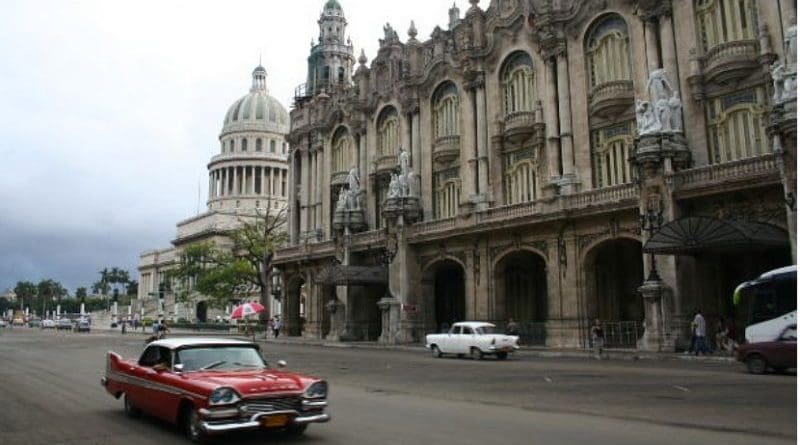Cuba Key Player In Global Campaign Against Iran – Analysis
By Dr. Theodore Karasik*
Saudi Foreign Minister Adel Al-Jubeir this week visited Cuba for two days. His visit should not come as a surprise, as Riyadh’s policy toward Havana and the wider Caribbean Basin has followed a new line of thinking.
Saudi-Cuban ties date back to 1956, with the Kingdom opening its Embassy in Havana in 2011. In May 2017, King Salman held talks in Jeddah with Cuban Deputy Prime Minister Ricardo Cabrisas and they agreed on bolstering economic cooperation. Saudi Arabia has also granted Cuba loans through the Saudi Development Fund to finance projects worth over $80 million.
Al-Jubeir’s visit to Cuba shows how Riyadh needs Havana to be part of its anti-extremist program. Riyadh is seeking to bring Cuba into its fold, especially against Iran, in order to mitigate any support from Havana to Tehran as the confrontation between the US and Iran grows.
Saudi Arabia is no longer standing by and watching how Iran conducts its foreign policy anywhere in the world. Riyadh took notice of how Cuban-Iranian relations have developed over time and given Tehran a hub in the Caribbean.
But there is a bigger issue. Cuba’s alliance with Iran dates back to 1979, when Fidel Castro became one of the first heads of state to recognize Iran’s clerics. Over the years, Castro created a unique relationship between secular, communist Cuba and theocratic Iran, united by a common hatred of the US and the liberal, democratic West.
Barack Obama sought to engage Cuba and Iran by initiating discrete and patient diplomatic approaches with two of America’s most aggressive antagonists. Last year, when US President Donald Trump signaled a reversal of Obama’s previous Cuban policy, Havana rushed to Tehran to sign cooperation agreements. As part of the non-aligned movement, or what is left of it, Cuba and Iran have teamed up for decades as part of ideological struggles. Now, in the age of geopolitics, this argument no longer has any validity given that countries are taking sides in a new dynamic involving the future of Iran.
Before the Joint Comprehensive Plan of Action, Tehran’s support for Havana was significant. In total, Cuba has received the equivalent of more than $1.2 billion in loans from Iran since 2005. With this financing, Cuba has begun to make critical investments in the rehabilitation of Soviet-era infrastructure. Iran is funding some 60 projects, ranging from the acquisition of 750 Iranian-made rail cars to the construction of power plants, dams, and highways. This infusion of Iranian capital is seen as a strategic threat.
Geographically, Cuba’s strategic location has enabled Iran, on at least one occasion, to engage in electronic attacks against US telecommunications that posed a threat to the Iranian regime. This type of behavior by Iran in Cuba is no longer acceptable. Recent claims of sonic warfare against the US Embassy in Havana may be tied to Tehran’s ability to harass US diplomats, although such activity could also be linked to other countries and their tit-for-tat balance sheet in this new geopolitical Cold War.
Al-Jubeir’s visit to Cuba is tied to the future of Venezuela, as Havana and Caracas have been aligned for decades. With OPEC member Venezuela in serious political and financial trouble, Saudi Arabia is keenly aware that Havana is a back door to Venezuela. Cuban support for Venezuela is across many spheres of political, economic and, especially, security and intelligence matters. Saudi foreign policy toward Venezuela is not only about Cuba and Iran but also the future of oil markets. Getting between Havana and Caracas is good for Saudi foreign policy in the Caribbean.
Trinidad and Tobago, meanwhile, is one of the largest liquefied natural gas producers in the world. As the leading producer of oil and gas in the Caribbean, Trinidad and Tobago maintains the most favorable economic climate in the region. Saudi interest in Pemex and Mexico’s energy infrastructure is also part of Riyadh’s calculus for the future of energy. As the energy picture changes in the Caribbean, Riyadh wants a front row seat for what comes next in America’s strategic backyard.
To be clear, shrinking Iran’s global footprint is part of Saudi strategy and Al-Jubeir’s visit to Havana sets a new tone in pulling Cuba away from Iran as Saudi Arabia and the US develop plans to confront the Iranian regime. Havana is seen as a key lynchpin in the geopolitical struggle and adding Cuba’s voice to Saudi objectives is important. Now is the time for Havana to challenge the ills of the Iranian regime.
• Dr. Theodore Karasik is a senior adviser to Gulf State Analytics in Washington, D.C.


Sounds like yet another Israeli-Saudi joint venture dressed up as the “Gulf States Analytica” to promote the untutored crown prince while ignoring Saudi war crimes in Yemen.